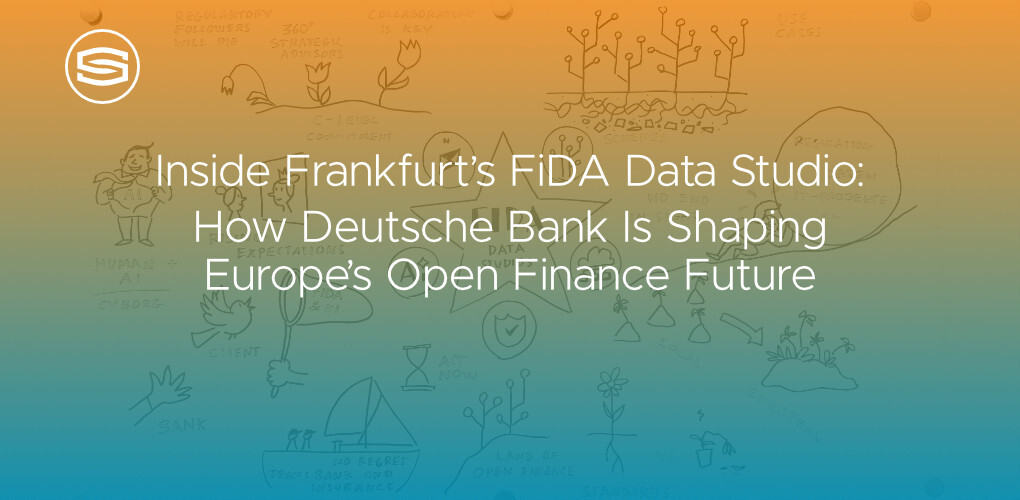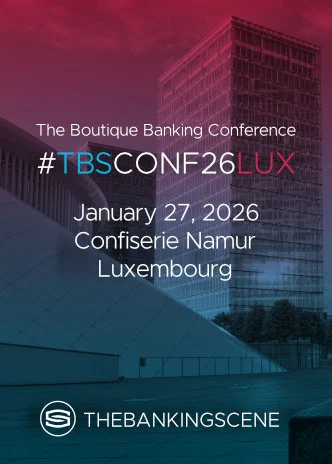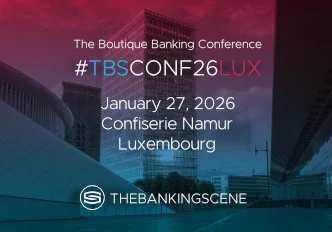
Insights & Opinions
FiDA - How Deutsche Bank Is Shaping Europe’s Open Finance Future
Mon, 06 Oct 2025


FiDA, the Financial Data Access Regulation, can become a cornerstone of the future European financial ecosystem. “Can” is a crucial word in that context, as you may have read on our blogs or heard at our events. FiDA, still under negotiation between the European Parliament and Council in 2025, is poised to extend open banking into full open finance.
It will give consumers and businesses greater control over their financial data, requiring banks, insurers, and investment firms to share information securely and transparently with authorised third parties. If adopted later this year, this open finance regulation FiDA could begin to apply as early as 2027, reshaping how data flows across Europe’s financial ecosystem.
That groundbreaking potential leads to significant resistance from financial services providers, resulting in silence on most conference stages, but numerous discussions behind the scenes. There are exceptions, though, one of them being Deutsche Bank.
During #SIBOS, Deutsche Bank and TechQuartier took a bold step to address these challenges by hosting the FiDA Data Studio on September 29th at the #EintrachtLab in Frankfurt. Together with stakeholders from across the financial industry, the event explored how Open Finance, structured data, and AI-powered services can unlock customer-focused, scalable innovation across Europe’s financial system.
A few of the stakeholders were Accenture, Innopay, FRIDA (Free Insurance Data Initiative), Omnifact and Xaver.
The programme was structured around four expert groups:
✔️ FiDA and AI: Turning data into smart insights
✔️ FiDA and Open Finance: Exploiting value from financial data for contextual insights and better decision-making
✔️ FiDA and Infrastructure: Building the backbone of the data ecosystem
✔️ FiDA and Strategy: Exploring promising use cases, business models, and strategic positions
Under Joris Hensen, who founded Deutsche Bank’s API Programme, the initiative surpassed your typical regulatory workshop. Andrew Vorster and I attended the event, but only from the evening, after the workshops. Luckily, we were all guided around the room to hear the key conclusions, with Q&A.
It demonstrated industry leadership, emphasised FiDA’s potential, reflected Deutsche Bank’s dedication to collaboration, and fostered a collective conversation about Europe’s financial future. Having Bernt Leukert, CIO at Deutsche Bank, underscored this.
FiDA as a Catalyst, Not a Constraint
Across all four sessions, a consistent message emerged: FiDA should not be a compliance project. The regulation, part of the EU’s broader digital finance strategy, will redefine how financial data is accessed, shared, and monetised, and its real power lies in how institutions interpret it. Banks that treat FiDA purely as an obligation risk adding an extra burden without any benefit, just like what happened with PSD2 and Open Banking.
Those that embrace it as a framework for innovation, collaboration, and customer empowerment can position themselves at the heart of Europe’s digital economy.
By convening peers, partners, and competitors, Deutsche Bank signalled that the future of open finance will be defined by those who engage early, experiment openly, and lead collaboratively.
Ideally, that would have meant having more banks in the room, but having the consultancy and tech firms around, and The Banking Scene, is a good start.
Infrastructure: The Foundation of Trust and Interoperability
One track focused on infrastructure. Participants agreed that the success of FiDA depends on interoperable, standardised, and trusted infrastructure. Yet, Europe’s financial landscape remains fragmented. Legacy systems, varying national regulations, and inconsistent API standards slow progress.
While full harmonisation across borders by 2030 is an ambitious goal, the discussions concluded that pragmatic, bottom-up collaboration could deliver meaningful progress sooner.
The recommendations were clear:
- Harmonise authentication and identification standards wherever possible.
- Create transparent governance frameworks for cross-industry cooperation.
- Replace the compliance mindset with a data-readiness mindset.
Infrastructure, participants agreed, is not a technical constraint. It is cultural and collaborative, the backbone of trust in an interconnected ecosystem, as well as a shared interest. Support for local schemes and initiatives is a sign of a defensive approach to maintain control over local interests, and that, in my opinion, is the main reason for fragmentation. Unfortunately, this kind of workshop can’t solve this issue.
Collaboration as a Competitive Strategy
A major insight from Frankfurt was that collaboration will be the new competitive advantage under FiDA.
The regulation opens the door for data sharing, but the market will determine how value is created and distributed. Early movers who join forces to define the standards and frameworks will shape the playing field. Late adopters will have to live with the outcomes set by others.
Participants called for inclusive, multi-stakeholder cooperation between banks, insurers, fintechs, regulators, and technology providers. These alliances should not become “closed shops” but open ecosystems that strike a balance between innovation and responsibility.
By organising this event, Deutsche Bank illustrated exactly what leadership in open finance looks like: not controlling the narrative, but enabling it. I cannot wait for the day when more banks join this kind of active events to find a mutual way to build value for both the institution and the customer, as more data can be shared.
As one participant summarised it: “If you wait for others to define the scheme, you’ll end up living with their results.”
From Data Access to Customer Value
Beyond the infrastructure debate, the discussions focused on how FiDA can unlock new forms of customer value. To me, this sounded a bit obvious, as it builds on the value proposition of open banking 10 years ago.
The regulation could transform banks and insurers from transactional service providers into 360° financial advisors: partners who help customers make better financial decisions across their entire lifecycle.
Participants discussed how structured financial data can enable:
- Hyper-personalised customer journeys
- Smarter product recommendations
- Improved risk management
- And more holistic financial advice
This transformation, according to the workstream experts, depends on one condition: customer trust. Data sharing only works if clients see tangible value in return. Consent must be earned through transparency, usefulness, and relevance.
I believe they are missing one piece, and I’m repeating myself, as it was part of another stream: aside from customer trust, we also require a high level of consistency and trust in the APIs that support data exchange.
AI and FiDA: The Intelligence Layer
The intersection of AI and FiDA generated the most forward-looking discussions. AI was seen as the natural complement to FiDA: the intelligence layer that turns structured data into actionable insights and actions. Banks no longer have to wait for regulation to innovate. By modernising their data infrastructure now, they can already apply AI to improve customer engagement, operational efficiency, and risk analysis.
However, participants were quick to note: AI cannot fix bad data. Clean, standardised, and ethically governed data remains the foundation of any AI-driven success.
The group also discussed the emergence of new digital competitors: conversational AI platforms, aggregators, and Big Tech, that could use FiDA access to compete for customer relationships. This conclusion may change once the regulation makes a final decision on whether or not to exclude “gatekeepers”, the Big Tech companies, from the fear that allowing them to use these new data streams may lead to unfair competition or exploitation of customers.
Nevertheless, to stay relevant, banks must do more than comply: they must become data users themselves, capable of creating intelligent, contextual, and personalised experiences faster than others.
Conclusion: From Compliance to Collaboration
The greatest challenge in realising FiDA’s promise is not technology - it is mindset. Many institutions still view this regulation as a defensive exercise rather than a strategic opportunity.
True leadership demands a shift from compliance to purpose, from ownership to partnership, and from protectionism to collaboration.
That shift was at the heart of Deutsche Bank’s FiDA Data Studio. Led by Joris Hensen, the initiative reaffirmed the bank’s role as a convener of innovation by opening dialogue and inviting the ecosystem to co-create Europe’s open-finance future. It embodied the spirit of the API Programme: building the bridges that real progress requires.
The message from Frankfurt was unmistakable:
The age of compliance is giving way to the age of collaboration.
Ultimately, FiDA’s success will depend on cooperation, not compliance.
The Banking Scene: Director's Cut
For this "Behind the Scenes" episode, we speak to two industry experts who actually participated in the full-day programme.
First up we hear from Nicola Breyer, Open Finance Advisor and Expert from the Open Finance Ecosystem organisation, who some of you might remember from our conference in Amsterdam earlier this year.
Then we hear from Anne-Sophie Morvan, Chief Commercial Officer at Luxhub, who will be a familiar face and voice to those who attended our conference in Luxembourg earlier this year.
BONUS CONTENT: In a dedicated interview, we also took a deeper dive into the topic with Joris Hensen himself!
You can view the videos below or follow on your favourite podcast platform here, and don’t forget to subscribe!
You can view the Interview with Joris Hensen below or follow on your favourite podcast platform here.



